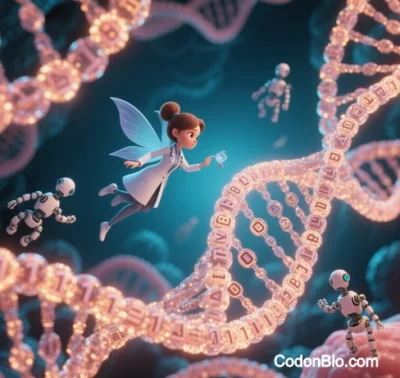
Can Codon Bio Redefine the Blueprint of Life?
Codon, the fundamental unit of the genetic code, has transcended traditional gene expression to become a frontier in synthetic biology, precision medicine, and bioengineering. By analyzing breakthroughs in codon recoding technologies and their applications, we explore how this innovation could reshape life’s “design blueprint” at the molecular level and assess its profound implications for humanity’s future.
I. The Biological Revolution of Codon Engineering
- From Natural Code to Artificial Programming
Codons—three-nucleotide sequences in DNA/RNA—correspond to specific amino acids. The redundancy of natural genetic code (e.g., 64 codons encoding 20 amino acids) allows artificial reprogramming. Scientists have engineered fully recoded synthetic organisms (GROs) through genome-wide codon compression (e.g., unifying stop codons), enabling antiviral capabilities and non-canonical amino acid integration. This technology breaks evolutionary constraints, making life’s “operating system” reprogrammable. - Industrial and Medical Potential of Synthetic Life
- Virus-Resistant Biofactories: By eliminating redundant codons exploited by viruses, microbes can be designed for safe drug or enzyme production. For example, George Church’s team proposed engineering virus-resistant pig organs to address transplant rejection.
- Non-Canonical Amino Acids: Reassigning codons to synthetic amino acids (e.g., photocrosslinking residues) enables novel protein functions, such as stable antibodies or stimuli-responsive materials.
- Genome Programmability Breakthroughs
Codon optimization tools (e.g., CRISPR-Cas13) refine gene expression frameworks. Adjusting codon usage bias enhances protein translation efficiency. In gene therapy, optimized codon sequences avoid mRNA secondary structures, improving therapeutic efficacy.
II. Redefining the “Life Blueprint” Across Four Dimensions
- Paradigm Shifts in Disease Treatment
- Cancer and Genetic Disorders: Codon engineering repairs pathogenic mutations (e.g., β-globin in sickle cell anemia) or designs CRISPR tools to degrade oncogenic mRNAs. Yale researchers synthesized novel tumor-suppressing pathways via codon recoding.
- Personalized Vaccines: Companies like Codon Devices use synthetic DNA to rapidly develop mRNA vaccines targeting individual tumor neoantigens.
- Human Enhancement and Longevity
- Telomere and Aging Regulation: Optimizing telomerase RNA (TERC) codons may delay cellular senescence.
- Metabolic Pathway Redesign: High-efficiency enzymes (e.g., LDHA) with optimized codons enhance energy utilization, potentially aiding anti-aging or athletic performance.
- Environmental Adaptation and Species Evolution
- Climate-Resilient Crops: Recoding drought- or salt-tolerance genes creates crops for extreme climates.
- Biodiversity Conservation: Repairing genetic defects (e.g., panda immune genes) strengthens endangered species’ survival.
- Ethical and Societal Challenges
- Genetic Privacy and Equity: Codon editing risks exposing genetic predispositions (e.g., disease risks), necessitating “neurodata firewalls.”
- Technological Divide: Unequal access to enhancement technologies could exacerbate social inequality.
III. Technical Hurdles and Future Pathways
- Core Challenges
- Dynamic Control Precision: Current tools lack real-time monitoring of codon dynamics at single-cell resolution.
- Off-Target Effects: Non-canonical amino acids may disrupt native protein interaction networks.
- Innovation Directions
- AI-Driven Codon Design: Tools like AlphaFold-RNA predict optimal codon combinations.
- Cross-Species Platforms: Modular codon toolkits for mammals, plants, and microbes.
- Industry Milestones
Field 2025–2030 Goals Long-Term Vision (2040+) Healthcare Launch codon-optimized gene therapies Scale personalized anti-aging codon editing Industrial Bio Establish virus-resistant biofactories Engineer organisms with fully synthetic amino acids Agroecology Release climate-resilient crops Re-engineer keystone species for ecosystems
IV. Philosophical Reflections: The Boundaries of Life’s Programmability
Codon engineering transforms life from a “product of evolution” to a “designable system,” raising profound debates:
- Redefining Life: If humans can write genetic code, is life merely an information carrier?
- Free Will vs. Determinism: Does genetic control undermine the “nature vs. nurture” balance?
- Ecological Ethics: Synthetic organisms may disrupt natural ecosystems, requiring global biosafety protocols.
Conclusion
Codon Bio is evolving from a molecular tool into a life-design platform, with potential extending beyond disease treatment to redefining life’s possibilities. However, this redefinition demands technological innovation, ethical consensus, and global collaboration. The critical question is not “if” but “how responsibly” codon engineering will shape the next chapter of human evolution.
Data sourced from public references. For collaboration or domain inquiries, contact: chuanchuan810@gmail.com





